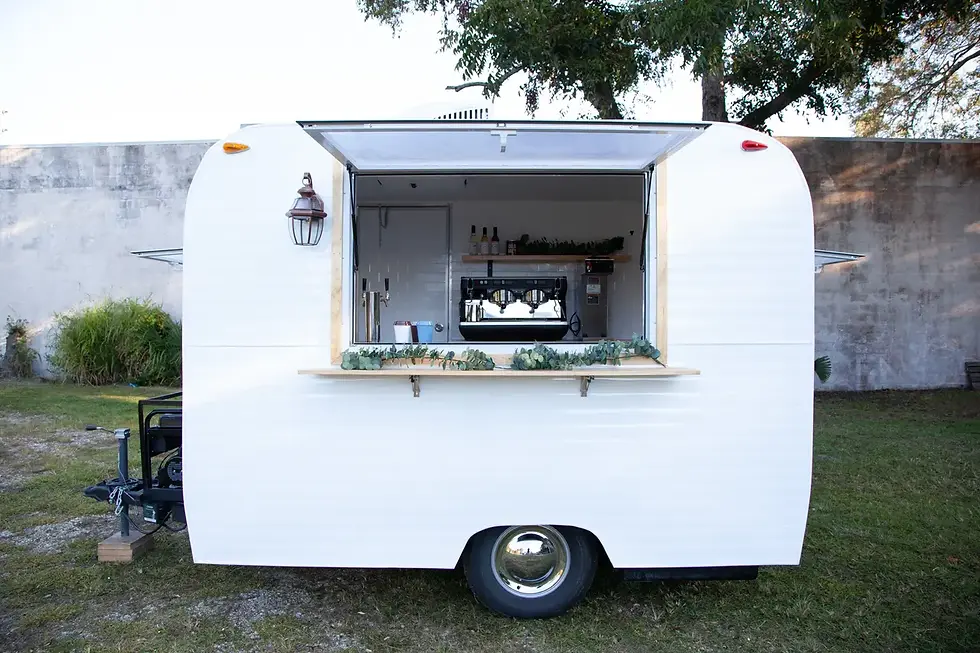Taking the Winter Season Off?
- Oct 25, 2024
- 3 min read
Updated: Nov 1, 2024
Here are some tips on how to winterize your mobile business in colder climates.
Winterization Tips for Your Mobile Business Trailer
As winter approaches, protecting your trailer and its water systems from freezing temperatures becomes crucial. Proper winterization not only guards against damage but also prepares your mobile business to be fully operational once warmer weather returns. Here's a step-by-step guide on how to winterize the fresh water tanks, sinks, and trailer interior/exterior. Take a pad of paper with you or your phone to make notes on your process, so when spring arrives, you can work backwards in re-installing elements and making your business road-ready again.

1. Drain and Protect Fresh Water Tanks
Empty the Fresh Water Tank
Begin by opening all faucets to allow water to drain from the fresh tank. If your tank has a drain port that runs through the floor, open this to help drain it faster. Be sure to avoid running the pump once the tank is nearly empty to prevent potential damage. Once drained, close all faucets.
Add RV Antifreeze
After draining the tank, add non-toxic RV antifreeze into the fresh water tank. Run it through the pump, hot water heater, and all plumbing lines to keep any residual water from freezing. Generally, one gallon of antifreeze is sufficient. Avoid filling the entire tank with antifreeze; instead, just enough to run through the lines will suffice.
2. Winterize the Sinks and Pipes
Once you’ve run antifreeze through the plumbing lines, unplug your pump and hot water heater. Leave your sink faucets open after unplugging your pump to allow air circulation and prevent any remaining water from freezing. Empty the waste tank completely, ensuring that no standing water remains in any lines or tanks.
3. Exterior Trailer Winterization
Seal Windows and Exterior Prep
Before storing your trailer, check that all windows are closed and properly sealed to prevent drafts or moisture accumulation. Washing and waxing the exterior will help protect against moisture, ice, and salt that could corrode the trailer's surface over winter. A trailer cover is ideal for shielding it from the elements, but even with a cover, regularly remove any snow and ice buildup from the roof to prevent structural strain.
Protect the Generator and Tires
Consider purchasing a cover specifically for your generator or opt for a trailer cover that accommodates it as well. Inflate your tires to the recommended pressure to avoid flat spots forming during storage.
4. Battery and Propane Systems
Battery Storage
If your trailer has a 12-volt battery for running lights or other electrical components, open the battery case on the hitch, remove the battery, and place it on a trickle charger over the winter. Store it in a cool, dry place to preserve its charge and extend its life. Make a special reminder in your calendar to check on it over the winter.
Shut Down the Propane System
If you have a propane system, turn off the propane supply and disconnect any propane appliances. Store the propane tanks safely, checking for any leaks or corrosion to prevent potential hazards.
5. Prepare the Interior
Remove Valuables and Food
Take out any valuables, electronics, and food items. Cold temperatures can damage electronics, and food/spills left inside can attract pests. Clean the trailer interior and floor before storage.
6. Removal of delicate equipment.
If you operate a coffee trailer, you may want to remove the coffee equipment depending on your location and freezing temperatures.
Final Walkthrough
Before covering and storing your trailer, perform a final walkthrough to confirm that all systems are properly drained, secured, and protected. Double-check locks, covers, and seals to ensure everything is tightly in place. When securing the trailer cover, tighten the straps gently but securely to prevent the cover from blowing off or causing any trailer damage during high winds. Check your trailer periodiaclly throughout the winter.
By following these winterization steps, you’ll protect your mobile business investment, ensuring a smooth transition back to business when spring arrives.



Comments